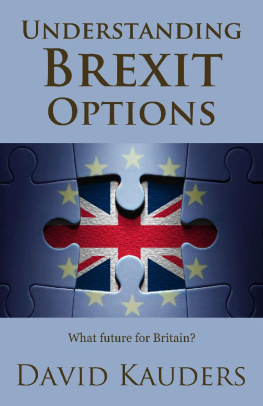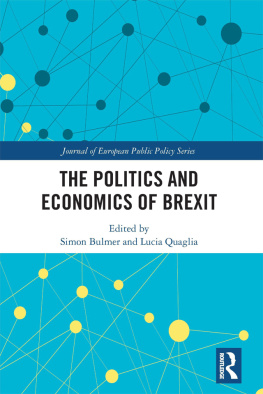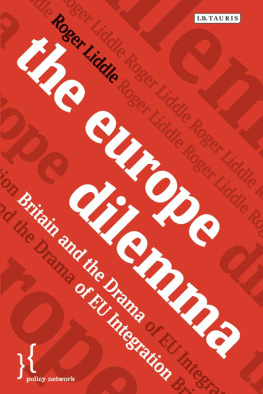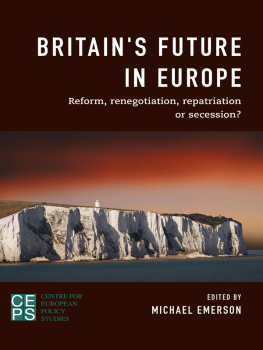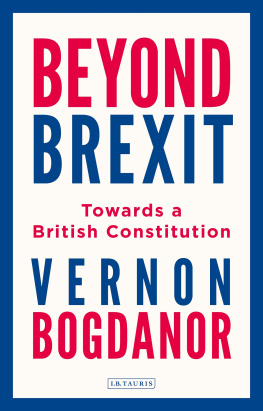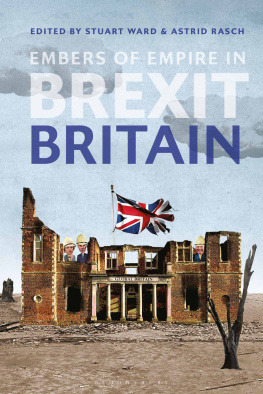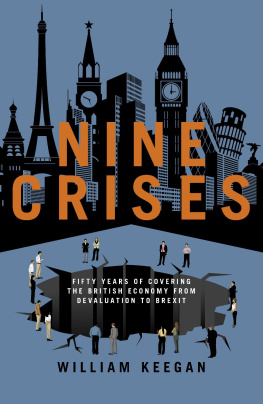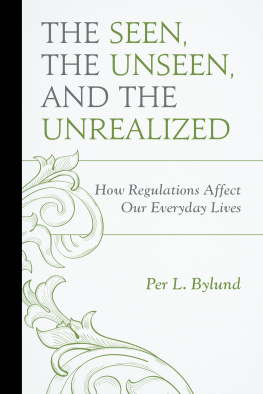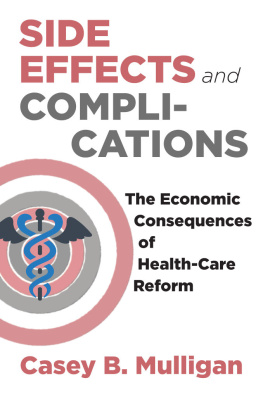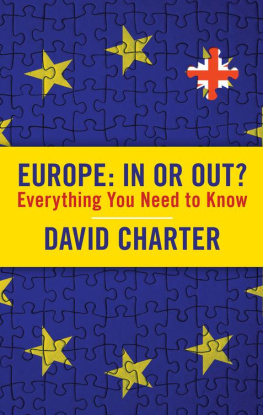Understanding Brexit Options
What future for Britain?
David Kauders
The right of David Kauders to be identified as the author of this work has been asserted under the terms of the Copyright, Designs and Patents Act, 1988.
Nothing in this book constitutes a financial promotion for the purposes of Section 21 of the Financial Services and Markets Act 2000 (United Kingdom), nor is anything in this book to be construed as financial advice for the purposes of the Investment Advisers Act of 1940 (USA).
No warranty is given with regard to the accuracy or completeness of any information herein. The author and publisher disclaim any liability or responsibility for any loss arising directly or indirectly from the use of any material in this book.
Without limiting the rights under copyright reserved herein, no part of this publication may be reproduced, stored in or introduced into a retrieval system or transmitted by any form or by any means without the prior written permission of the publisher. Except in the United States of America, this publication may not be hired out, whether for a fee or otherwise, in any cover or binding other than as supplied by the publisher.
British Library Cataloguing in Publication Data. A catalogue record for this book is available from the British Library.
All rights reserved.
Sparkling Books Ltd 2016
Edited by Sue Merron
Cover design Rosangela Cuffaro / iStock.com / CharlieAJA
1.3
Acknowledgements
Data taken from House of Commons Library research briefings: contains Parliamentary information licensed under the Open Parliament Licence v3.0.
During the summer and early-autumn months of 2016 in which this book was originally written, the UK press and media have carried extensive coverage of Brexit-related issues. Many individual points have appeared in more than one source. Apart from specific references that appear in the text, it would be inappropriate to attribute particular items to individual sources. The author would like to thank all the media for the extent of their collective coverage. The author also thanks everyone who has helped with this book for their dedication to Britain.
The author
David Kauders FRSA was educated at Latymer Upper School, Jesus College Cambridge and Cranfield School of Management. He is an investment manager and also contributes occasional articles to the UK financial press.
By the same author
The Greatest Crash: How contradictory policies are sinking the global economy
Bear Markets: When finance turns upside down
Wisdom from our forebears
A bird in the hand is worth two in the bush
proverb
[He] warns the heads of parties against believing their own lies
Dr John Arbuthnot (1667-1735)
Men, it has been well said, think in herds; it will be seen that they go mad in herds, while they only recover their senses slowly, and one by one.
Extraordinary Popular Delusions and the Madness of Crowds ,
Charles Mackay, preface to 1852 edition
Just the place for a Snark!" the Bellman cried,
As he landed his crew with care;
Supporting each man on the top of the tide
By a finger entwined in his hair.
Just the place for a Snark! I have said it twice:
That alone should encourage the crew.
Just the place for a Snark! I have said it thrice:
What I tell you three times is true.
The Hunting of the Snark, Lewis Carroll
... they display in particular only a slight aptitude for reasoning, the absence of a critical spirit, irritability, credulity, and simplicity. In their decision, moreover, is to be traced the influence of the leaders of crowds and the part played by ... affirmation, repetition, prestige and contagion.
Psychology of Crowds,
Gustave le Bon, Electoral crowds
Abbreviations
For brevity, I have used the following expressions:
UK for the United Kingdom of Great Britain and Northern Ireland (Royaume-Uni), which I also refer to as Britain;
EU for the European Union (LUnion Europ enne);
EFTA for the European Free Trade Association (Norway, Iceland, Liechtenstein and Switzerland);
EEA for the countries that are party to the European Economic Area Agreement (also known as the single market ), namely all 28 EU member states (including the UK) plus Norway, Iceland and Liechtenstein;
UKIP for the United Kingdom Independence Party;
SNP for the Scottish National Party; and
GDP for Gross Domestic Product, a common measure of the size of a countrys economy.
Other abbreviations are explained when first used.
I also use the jargon word Brexiter to mean anyone encouraging Britain to leave the EU, whether or no t they held or hold any formal role within any specific campaign or political party.
Tables
Table 1 Hard versus Soft Brexit
Table 2 Key points about the main Brexit options
Table 3 EFTA nations
Table 4 EU trade in relation to GDP
Table 5 Satisfying Scotland
Table 6 The fall in UK living standards 2007-2012
Table 7 Mistakes in the referendum campaign
Table 8 Examples of continuing mistakes
For clarity, tables 1, 2 and 5 are available at www.sparklingbooks.com/brexit.html
Introduction
This book grew out of some private research about Britains relationship with Europe. Given the risks to the British economy, to the unity of the United Kingdom and to European cooperation, I thought it useful to investigate further. My aim is to provide information and enable the reader to draw logical conclusions, and therefore I have avoided an academic study.
Chapter 1 is the key that unlocks the door and therefore the main part of the book. It explains the options that Britain has. These options need to be understood more widely, because the particular course of action chosen by the government leaving everything and trying for a quick, comprehensive free-trade agreement seems dangerous and risky. Because these options are so important, they appear first, with the supporting detail following in later chapters.
Chapter 2 discusses Britains trade issues in more detail and shows how errors and misconceptions have surfaced. Chapter 3 covers the non-trade factors, notably how to reunite the United Kingdom following the divisive referendum campaign. Chapter 4 deals with Britains mishandled relationship with Europe, chapter 5 looks at the state of the UK and chapter 6 summarises the main points and deals with the political issue.
The anti-establishment feeling that is now manifesting itself throughout Europe, as in the United States, can be traced to the failure of Keynesian economic stimulus as the limit to debt creation is reached, together with a new economic cycle driven by central bank monetary policies. I call the limit to debt creation the financial system limit and the reader will find this and related economic topics discussed in my other books.
In recent months, there have been many claims and counter-claims about the merits of particular relationships between Britain and the rest of Europe. One particularly unusual claim is that Britain will be better off, because countries lacking free-trade agreements with the EU have shown faster growth rates. The claim is based on published statistics, but the countries leading the we did better pack are generally low-wage low-price economies: Bangladesh, China, Russia, India, Nigeria, Malaysia, Brazil, Thailand, Indonesia, as examples. Britain is not a low wage economy seeking to industrialise through bargain-basement prices. As the rising rate of resignations of European doctors and nurses from the NHS has shown, Britain has much to lose from its present infrastructure. The argument that Britain can walk away without economic damage lacks context.

